An Examination of Organisational Culture and SME Innovation
VerifiedAdded on 2022/08/19
|11
|2900
|13
Report
AI Summary
This report, a literature review, delves into the critical relationship between organizational culture and innovative capabilities within Small and Medium Enterprises (SMEs) in the service industry. The study emphasizes the importance of fostering a culture that encourages creativity, flexibility, and risk-taking to enhance business performance and sustainability in a competitive market. It explores the various dimensions of organizational culture, including values, norms, and work practices, and their impact on the ability of SMEs to develop new products, processes, and systems. The report examines the nexus between organizational culture and innovation, highlighting the need for a dynamic operating environment that supports innovation. It provides recommendations for SMEs, emphasizing the need for clear communication of business goals, employee empowerment, and diversity in the workplace to drive innovation and achieve long-term success. The analysis draws on various scholarly sources to support its findings and recommendations.
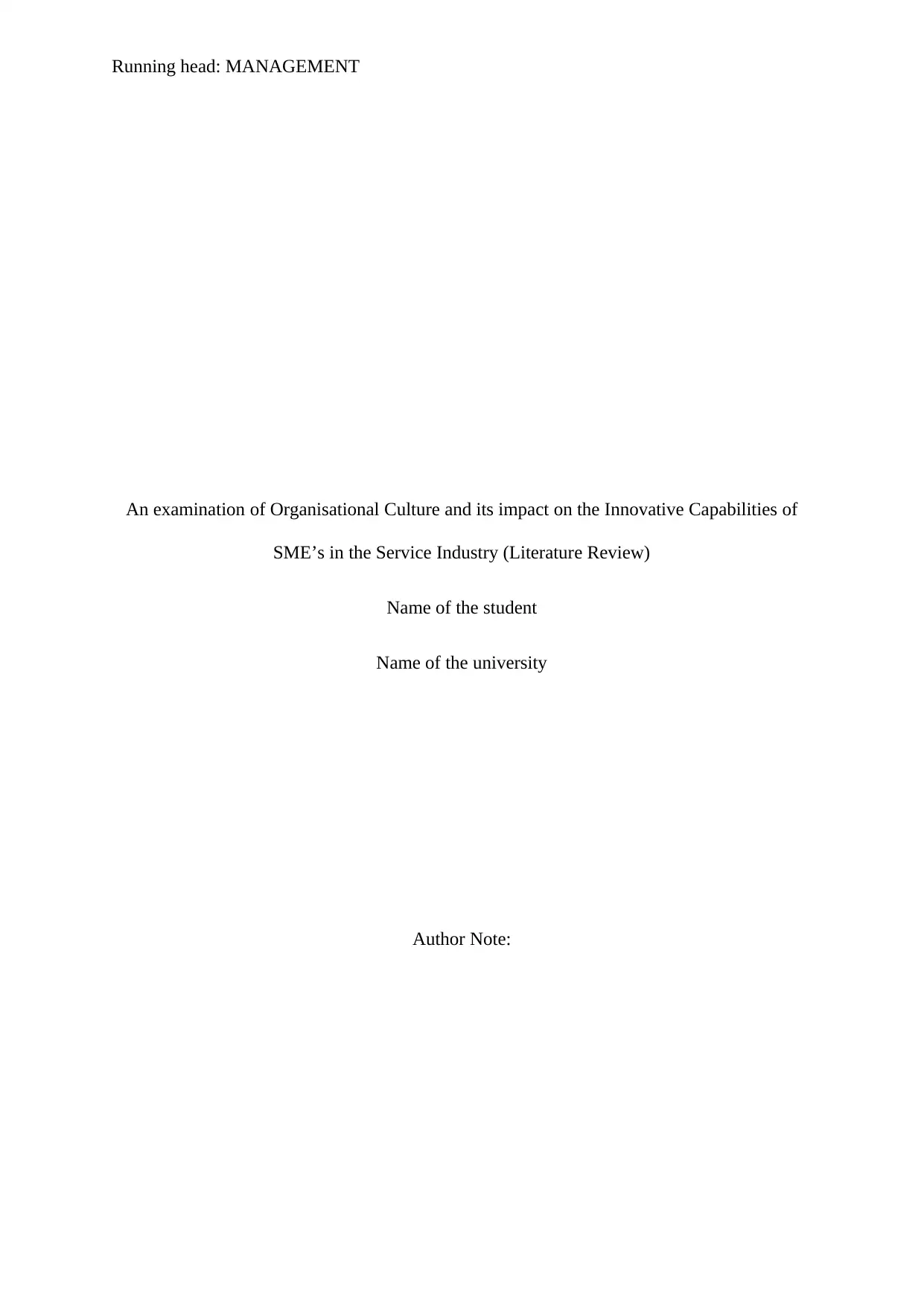
Running head: MANAGEMENT
An examination of Organisational Culture and its impact on the Innovative Capabilities of
SME’s in the Service Industry (Literature Review)
Name of the student
Name of the university
Author Note:
An examination of Organisational Culture and its impact on the Innovative Capabilities of
SME’s in the Service Industry (Literature Review)
Name of the student
Name of the university
Author Note:
Paraphrase This Document
Need a fresh take? Get an instant paraphrase of this document with our AI Paraphraser
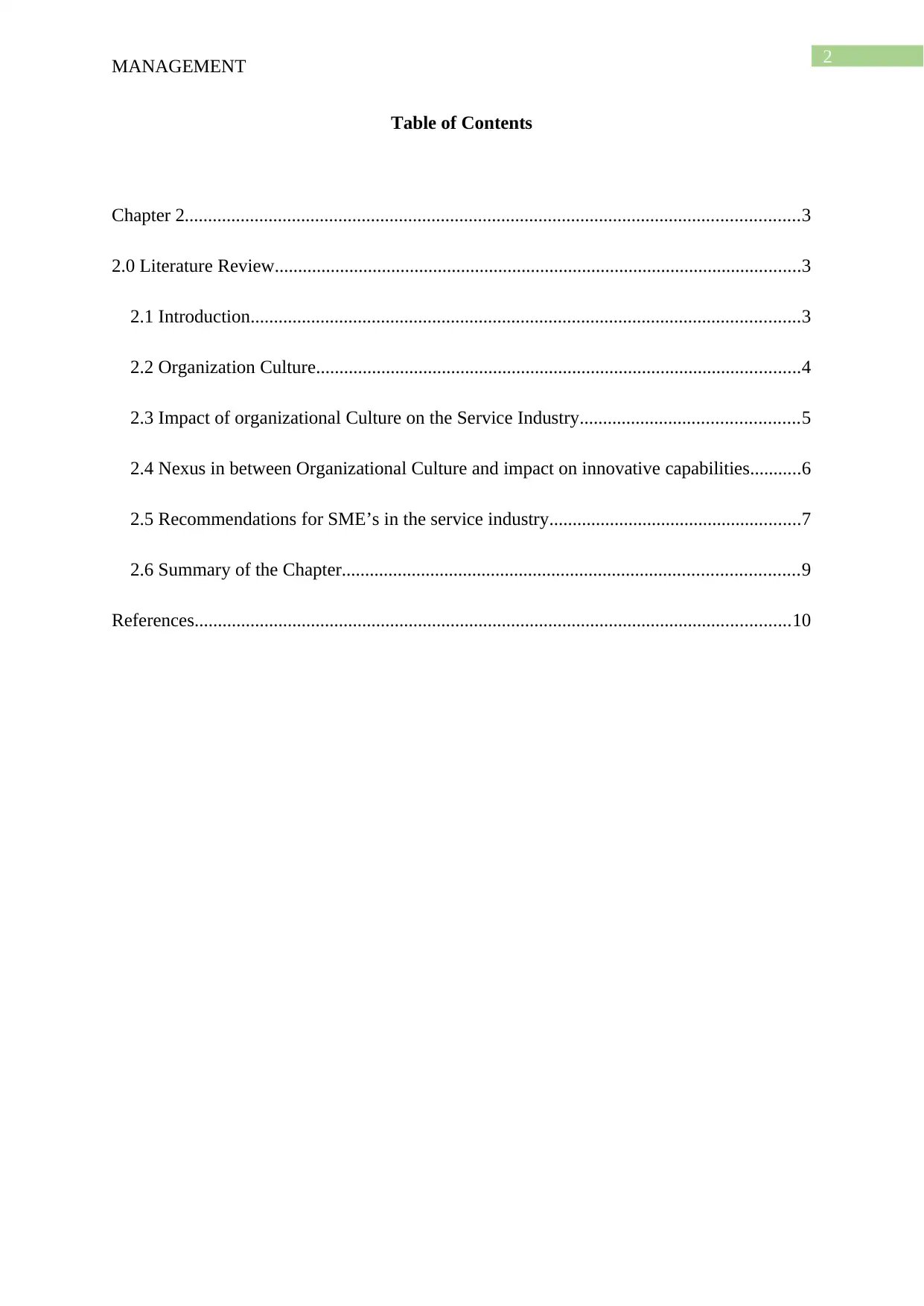
2
MANAGEMENT
Table of Contents
Chapter 2....................................................................................................................................3
2.0 Literature Review.................................................................................................................3
2.1 Introduction......................................................................................................................3
2.2 Organization Culture........................................................................................................4
2.3 Impact of organizational Culture on the Service Industry...............................................5
2.4 Nexus in between Organizational Culture and impact on innovative capabilities...........6
2.5 Recommendations for SME’s in the service industry......................................................7
2.6 Summary of the Chapter..................................................................................................9
References................................................................................................................................10
MANAGEMENT
Table of Contents
Chapter 2....................................................................................................................................3
2.0 Literature Review.................................................................................................................3
2.1 Introduction......................................................................................................................3
2.2 Organization Culture........................................................................................................4
2.3 Impact of organizational Culture on the Service Industry...............................................5
2.4 Nexus in between Organizational Culture and impact on innovative capabilities...........6
2.5 Recommendations for SME’s in the service industry......................................................7
2.6 Summary of the Chapter..................................................................................................9
References................................................................................................................................10
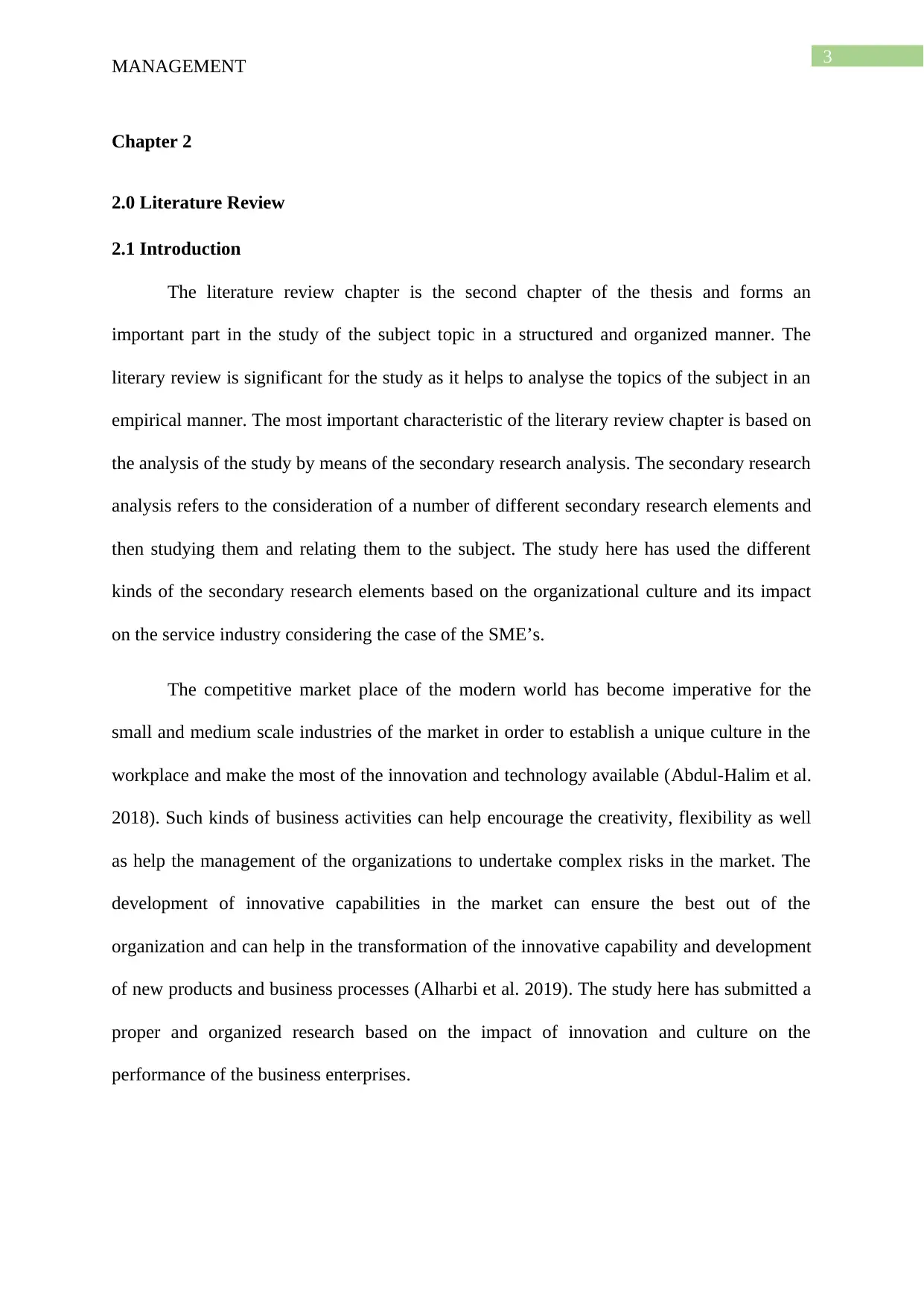
3
MANAGEMENT
Chapter 2
2.0 Literature Review
2.1 Introduction
The literature review chapter is the second chapter of the thesis and forms an
important part in the study of the subject topic in a structured and organized manner. The
literary review is significant for the study as it helps to analyse the topics of the subject in an
empirical manner. The most important characteristic of the literary review chapter is based on
the analysis of the study by means of the secondary research analysis. The secondary research
analysis refers to the consideration of a number of different secondary research elements and
then studying them and relating them to the subject. The study here has used the different
kinds of the secondary research elements based on the organizational culture and its impact
on the service industry considering the case of the SME’s.
The competitive market place of the modern world has become imperative for the
small and medium scale industries of the market in order to establish a unique culture in the
workplace and make the most of the innovation and technology available (Abdul-Halim et al.
2018). Such kinds of business activities can help encourage the creativity, flexibility as well
as help the management of the organizations to undertake complex risks in the market. The
development of innovative capabilities in the market can ensure the best out of the
organization and can help in the transformation of the innovative capability and development
of new products and business processes (Alharbi et al. 2019). The study here has submitted a
proper and organized research based on the impact of innovation and culture on the
performance of the business enterprises.
MANAGEMENT
Chapter 2
2.0 Literature Review
2.1 Introduction
The literature review chapter is the second chapter of the thesis and forms an
important part in the study of the subject topic in a structured and organized manner. The
literary review is significant for the study as it helps to analyse the topics of the subject in an
empirical manner. The most important characteristic of the literary review chapter is based on
the analysis of the study by means of the secondary research analysis. The secondary research
analysis refers to the consideration of a number of different secondary research elements and
then studying them and relating them to the subject. The study here has used the different
kinds of the secondary research elements based on the organizational culture and its impact
on the service industry considering the case of the SME’s.
The competitive market place of the modern world has become imperative for the
small and medium scale industries of the market in order to establish a unique culture in the
workplace and make the most of the innovation and technology available (Abdul-Halim et al.
2018). Such kinds of business activities can help encourage the creativity, flexibility as well
as help the management of the organizations to undertake complex risks in the market. The
development of innovative capabilities in the market can ensure the best out of the
organization and can help in the transformation of the innovative capability and development
of new products and business processes (Alharbi et al. 2019). The study here has submitted a
proper and organized research based on the impact of innovation and culture on the
performance of the business enterprises.
⊘ This is a preview!⊘
Do you want full access?
Subscribe today to unlock all pages.

Trusted by 1+ million students worldwide
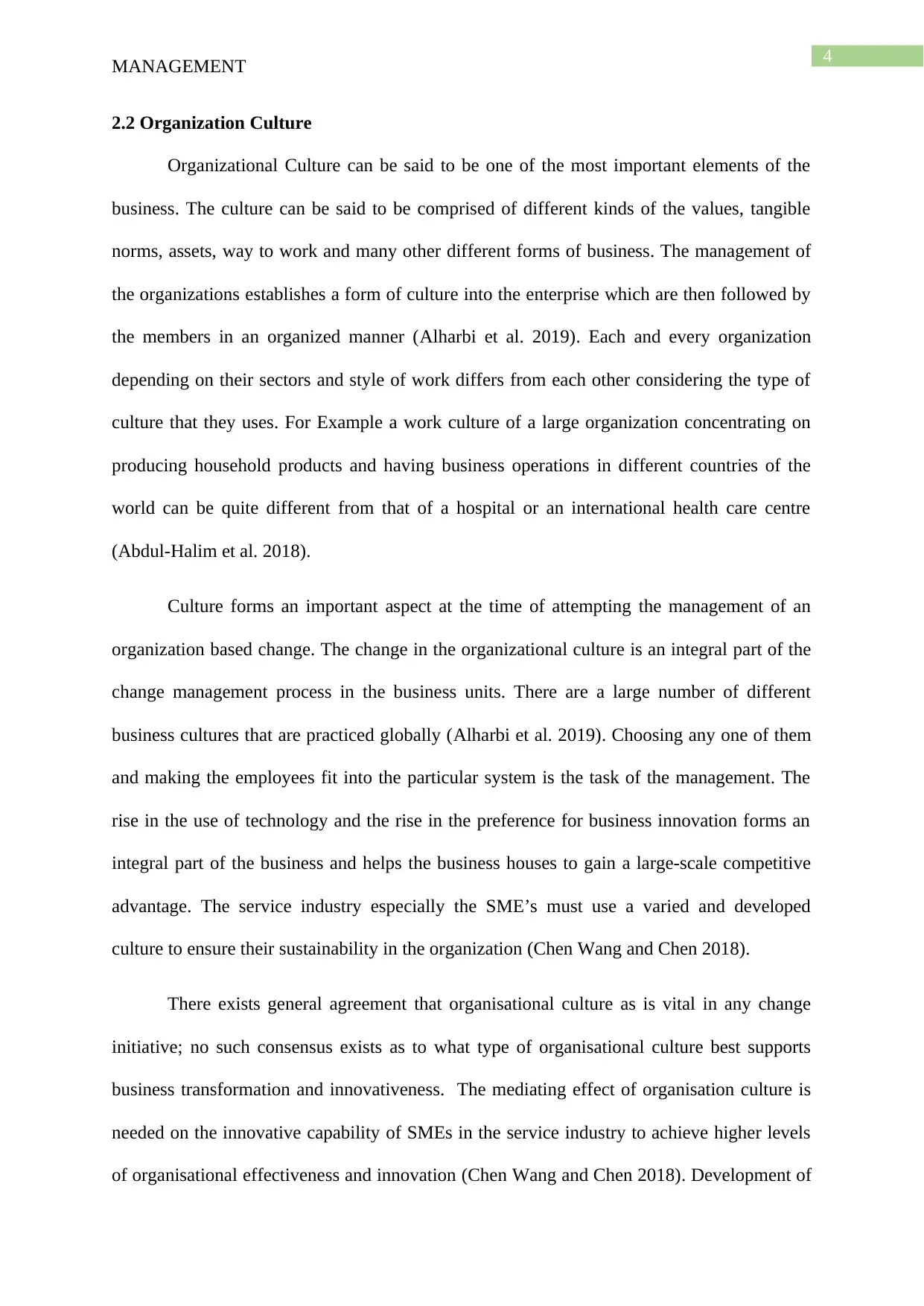
4
MANAGEMENT
2.2 Organization Culture
Organizational Culture can be said to be one of the most important elements of the
business. The culture can be said to be comprised of different kinds of the values, tangible
norms, assets, way to work and many other different forms of business. The management of
the organizations establishes a form of culture into the enterprise which are then followed by
the members in an organized manner (Alharbi et al. 2019). Each and every organization
depending on their sectors and style of work differs from each other considering the type of
culture that they uses. For Example a work culture of a large organization concentrating on
producing household products and having business operations in different countries of the
world can be quite different from that of a hospital or an international health care centre
(Abdul-Halim et al. 2018).
Culture forms an important aspect at the time of attempting the management of an
organization based change. The change in the organizational culture is an integral part of the
change management process in the business units. There are a large number of different
business cultures that are practiced globally (Alharbi et al. 2019). Choosing any one of them
and making the employees fit into the particular system is the task of the management. The
rise in the use of technology and the rise in the preference for business innovation forms an
integral part of the business and helps the business houses to gain a large-scale competitive
advantage. The service industry especially the SME’s must use a varied and developed
culture to ensure their sustainability in the organization (Chen Wang and Chen 2018).
There exists general agreement that organisational culture as is vital in any change
initiative; no such consensus exists as to what type of organisational culture best supports
business transformation and innovativeness. The mediating effect of organisation culture is
needed on the innovative capability of SMEs in the service industry to achieve higher levels
of organisational effectiveness and innovation (Chen Wang and Chen 2018). Development of
MANAGEMENT
2.2 Organization Culture
Organizational Culture can be said to be one of the most important elements of the
business. The culture can be said to be comprised of different kinds of the values, tangible
norms, assets, way to work and many other different forms of business. The management of
the organizations establishes a form of culture into the enterprise which are then followed by
the members in an organized manner (Alharbi et al. 2019). Each and every organization
depending on their sectors and style of work differs from each other considering the type of
culture that they uses. For Example a work culture of a large organization concentrating on
producing household products and having business operations in different countries of the
world can be quite different from that of a hospital or an international health care centre
(Abdul-Halim et al. 2018).
Culture forms an important aspect at the time of attempting the management of an
organization based change. The change in the organizational culture is an integral part of the
change management process in the business units. There are a large number of different
business cultures that are practiced globally (Alharbi et al. 2019). Choosing any one of them
and making the employees fit into the particular system is the task of the management. The
rise in the use of technology and the rise in the preference for business innovation forms an
integral part of the business and helps the business houses to gain a large-scale competitive
advantage. The service industry especially the SME’s must use a varied and developed
culture to ensure their sustainability in the organization (Chen Wang and Chen 2018).
There exists general agreement that organisational culture as is vital in any change
initiative; no such consensus exists as to what type of organisational culture best supports
business transformation and innovativeness. The mediating effect of organisation culture is
needed on the innovative capability of SMEs in the service industry to achieve higher levels
of organisational effectiveness and innovation (Chen Wang and Chen 2018). Development of
Paraphrase This Document
Need a fresh take? Get an instant paraphrase of this document with our AI Paraphraser
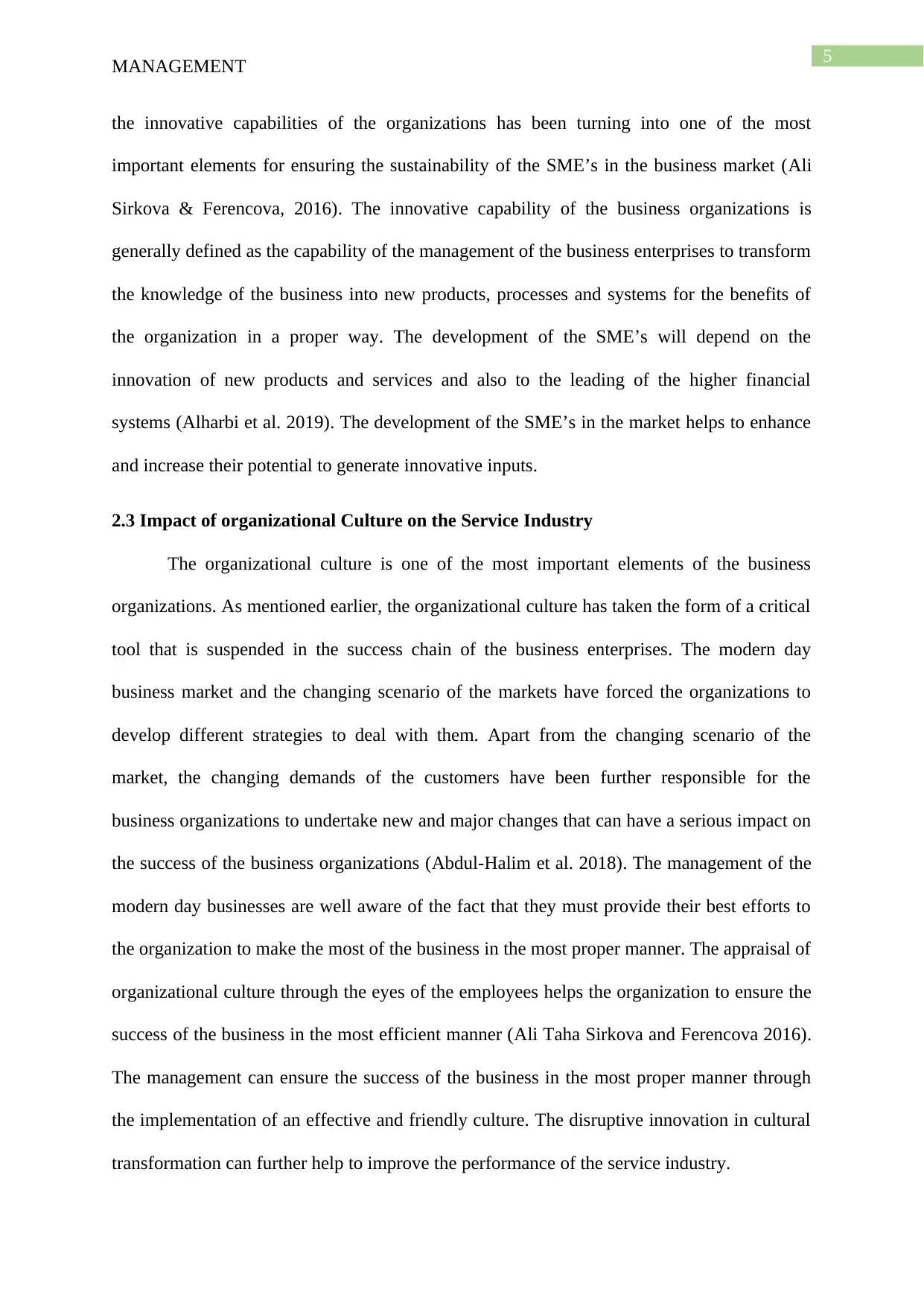
5
MANAGEMENT
the innovative capabilities of the organizations has been turning into one of the most
important elements for ensuring the sustainability of the SME’s in the business market (Ali
Sirkova & Ferencova, 2016). The innovative capability of the business organizations is
generally defined as the capability of the management of the business enterprises to transform
the knowledge of the business into new products, processes and systems for the benefits of
the organization in a proper way. The development of the SME’s will depend on the
innovation of new products and services and also to the leading of the higher financial
systems (Alharbi et al. 2019). The development of the SME’s in the market helps to enhance
and increase their potential to generate innovative inputs.
2.3 Impact of organizational Culture on the Service Industry
The organizational culture is one of the most important elements of the business
organizations. As mentioned earlier, the organizational culture has taken the form of a critical
tool that is suspended in the success chain of the business enterprises. The modern day
business market and the changing scenario of the markets have forced the organizations to
develop different strategies to deal with them. Apart from the changing scenario of the
market, the changing demands of the customers have been further responsible for the
business organizations to undertake new and major changes that can have a serious impact on
the success of the business organizations (Abdul-Halim et al. 2018). The management of the
modern day businesses are well aware of the fact that they must provide their best efforts to
the organization to make the most of the business in the most proper manner. The appraisal of
organizational culture through the eyes of the employees helps the organization to ensure the
success of the business in the most efficient manner (Ali Taha Sirkova and Ferencova 2016).
The management can ensure the success of the business in the most proper manner through
the implementation of an effective and friendly culture. The disruptive innovation in cultural
transformation can further help to improve the performance of the service industry.
MANAGEMENT
the innovative capabilities of the organizations has been turning into one of the most
important elements for ensuring the sustainability of the SME’s in the business market (Ali
Sirkova & Ferencova, 2016). The innovative capability of the business organizations is
generally defined as the capability of the management of the business enterprises to transform
the knowledge of the business into new products, processes and systems for the benefits of
the organization in a proper way. The development of the SME’s will depend on the
innovation of new products and services and also to the leading of the higher financial
systems (Alharbi et al. 2019). The development of the SME’s in the market helps to enhance
and increase their potential to generate innovative inputs.
2.3 Impact of organizational Culture on the Service Industry
The organizational culture is one of the most important elements of the business
organizations. As mentioned earlier, the organizational culture has taken the form of a critical
tool that is suspended in the success chain of the business enterprises. The modern day
business market and the changing scenario of the markets have forced the organizations to
develop different strategies to deal with them. Apart from the changing scenario of the
market, the changing demands of the customers have been further responsible for the
business organizations to undertake new and major changes that can have a serious impact on
the success of the business organizations (Abdul-Halim et al. 2018). The management of the
modern day businesses are well aware of the fact that they must provide their best efforts to
the organization to make the most of the business in the most proper manner. The appraisal of
organizational culture through the eyes of the employees helps the organization to ensure the
success of the business in the most efficient manner (Ali Taha Sirkova and Ferencova 2016).
The management can ensure the success of the business in the most proper manner through
the implementation of an effective and friendly culture. The disruptive innovation in cultural
transformation can further help to improve the performance of the service industry.
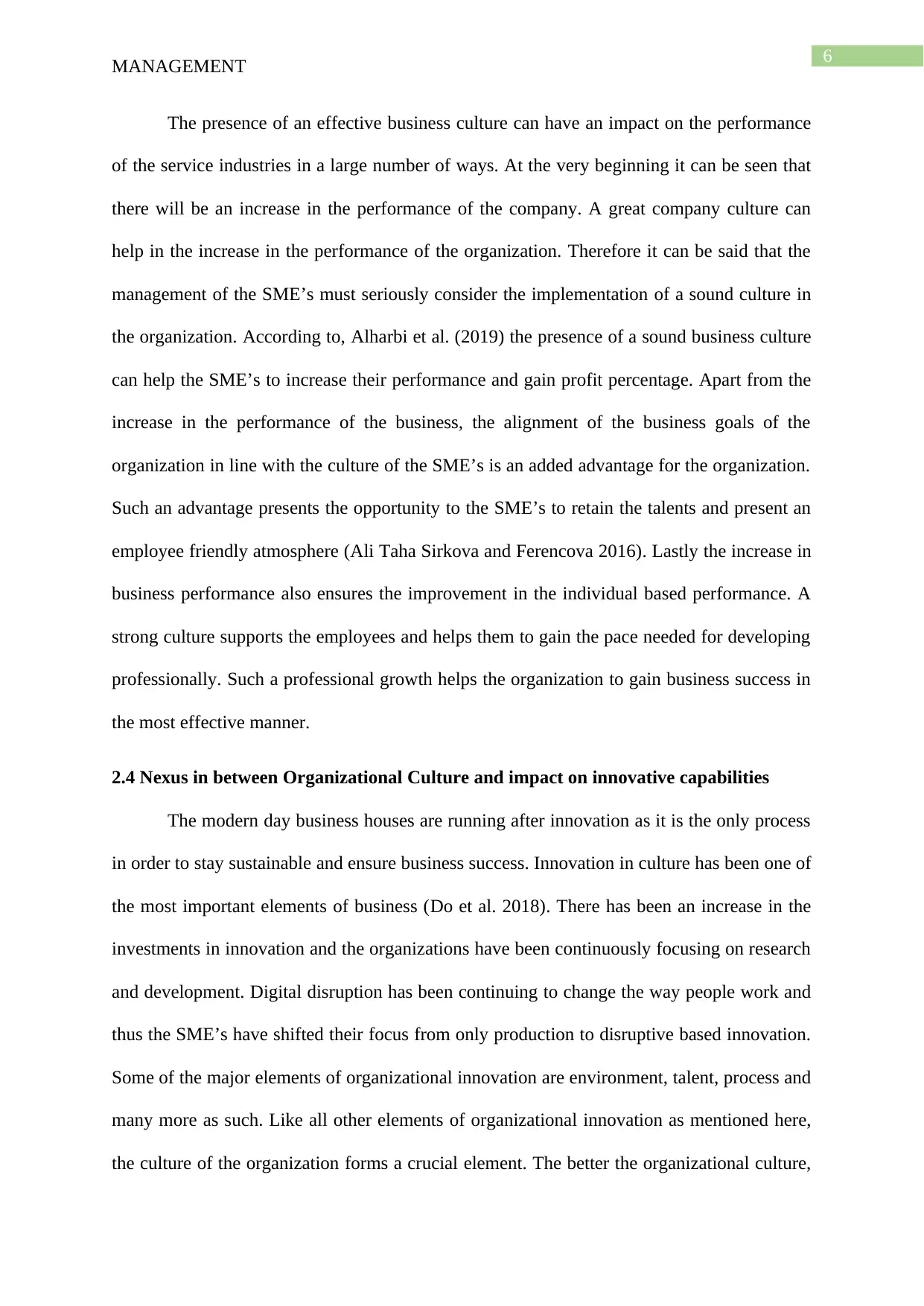
6
MANAGEMENT
The presence of an effective business culture can have an impact on the performance
of the service industries in a large number of ways. At the very beginning it can be seen that
there will be an increase in the performance of the company. A great company culture can
help in the increase in the performance of the organization. Therefore it can be said that the
management of the SME’s must seriously consider the implementation of a sound culture in
the organization. According to, Alharbi et al. (2019) the presence of a sound business culture
can help the SME’s to increase their performance and gain profit percentage. Apart from the
increase in the performance of the business, the alignment of the business goals of the
organization in line with the culture of the SME’s is an added advantage for the organization.
Such an advantage presents the opportunity to the SME’s to retain the talents and present an
employee friendly atmosphere (Ali Taha Sirkova and Ferencova 2016). Lastly the increase in
business performance also ensures the improvement in the individual based performance. A
strong culture supports the employees and helps them to gain the pace needed for developing
professionally. Such a professional growth helps the organization to gain business success in
the most effective manner.
2.4 Nexus in between Organizational Culture and impact on innovative capabilities
The modern day business houses are running after innovation as it is the only process
in order to stay sustainable and ensure business success. Innovation in culture has been one of
the most important elements of business (Do et al. 2018). There has been an increase in the
investments in innovation and the organizations have been continuously focusing on research
and development. Digital disruption has been continuing to change the way people work and
thus the SME’s have shifted their focus from only production to disruptive based innovation.
Some of the major elements of organizational innovation are environment, talent, process and
many more as such. Like all other elements of organizational innovation as mentioned here,
the culture of the organization forms a crucial element. The better the organizational culture,
MANAGEMENT
The presence of an effective business culture can have an impact on the performance
of the service industries in a large number of ways. At the very beginning it can be seen that
there will be an increase in the performance of the company. A great company culture can
help in the increase in the performance of the organization. Therefore it can be said that the
management of the SME’s must seriously consider the implementation of a sound culture in
the organization. According to, Alharbi et al. (2019) the presence of a sound business culture
can help the SME’s to increase their performance and gain profit percentage. Apart from the
increase in the performance of the business, the alignment of the business goals of the
organization in line with the culture of the SME’s is an added advantage for the organization.
Such an advantage presents the opportunity to the SME’s to retain the talents and present an
employee friendly atmosphere (Ali Taha Sirkova and Ferencova 2016). Lastly the increase in
business performance also ensures the improvement in the individual based performance. A
strong culture supports the employees and helps them to gain the pace needed for developing
professionally. Such a professional growth helps the organization to gain business success in
the most effective manner.
2.4 Nexus in between Organizational Culture and impact on innovative capabilities
The modern day business houses are running after innovation as it is the only process
in order to stay sustainable and ensure business success. Innovation in culture has been one of
the most important elements of business (Do et al. 2018). There has been an increase in the
investments in innovation and the organizations have been continuously focusing on research
and development. Digital disruption has been continuing to change the way people work and
thus the SME’s have shifted their focus from only production to disruptive based innovation.
Some of the major elements of organizational innovation are environment, talent, process and
many more as such. Like all other elements of organizational innovation as mentioned here,
the culture of the organization forms a crucial element. The better the organizational culture,
⊘ This is a preview!⊘
Do you want full access?
Subscribe today to unlock all pages.

Trusted by 1+ million students worldwide
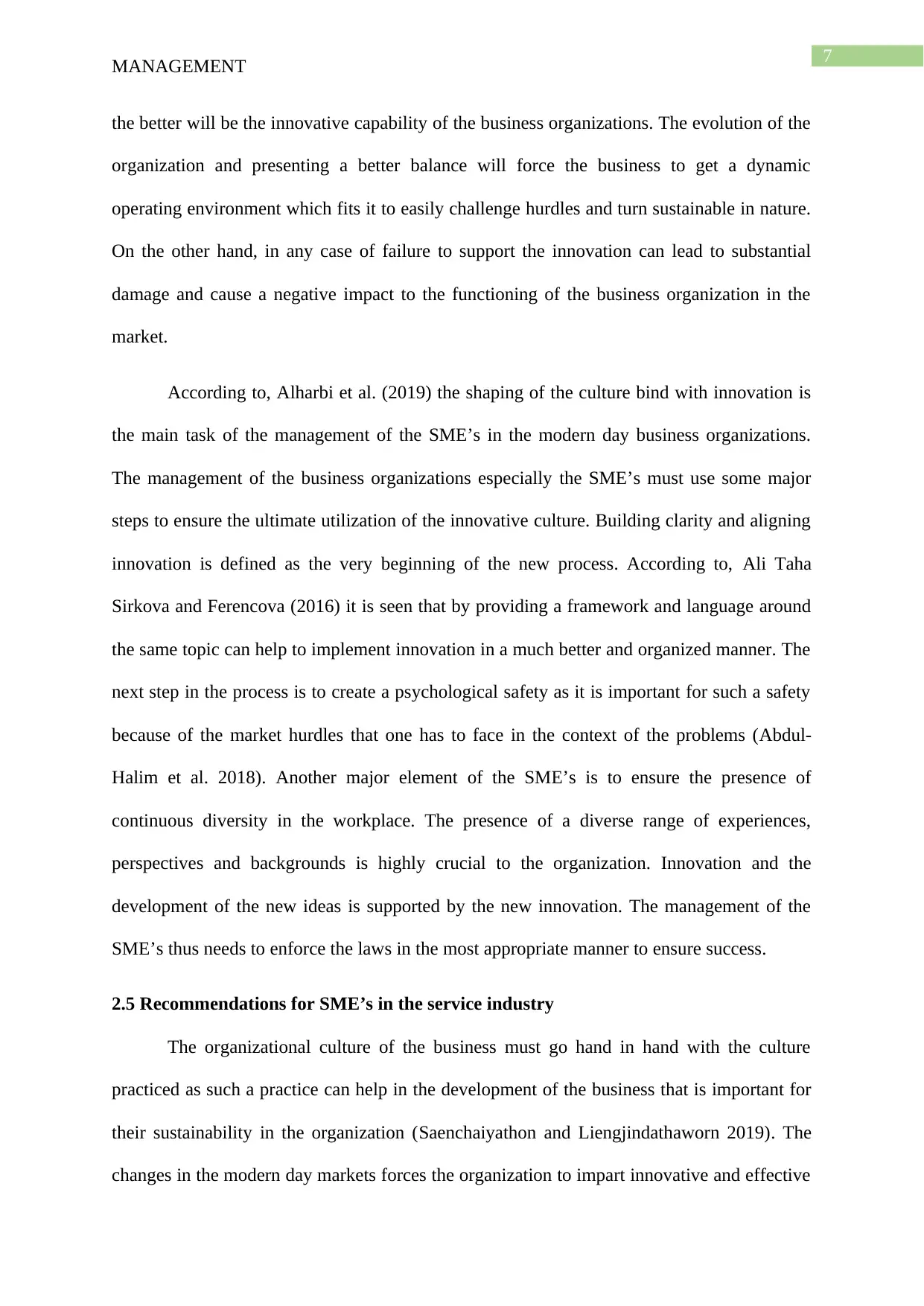
7
MANAGEMENT
the better will be the innovative capability of the business organizations. The evolution of the
organization and presenting a better balance will force the business to get a dynamic
operating environment which fits it to easily challenge hurdles and turn sustainable in nature.
On the other hand, in any case of failure to support the innovation can lead to substantial
damage and cause a negative impact to the functioning of the business organization in the
market.
According to, Alharbi et al. (2019) the shaping of the culture bind with innovation is
the main task of the management of the SME’s in the modern day business organizations.
The management of the business organizations especially the SME’s must use some major
steps to ensure the ultimate utilization of the innovative culture. Building clarity and aligning
innovation is defined as the very beginning of the new process. According to, Ali Taha
Sirkova and Ferencova (2016) it is seen that by providing a framework and language around
the same topic can help to implement innovation in a much better and organized manner. The
next step in the process is to create a psychological safety as it is important for such a safety
because of the market hurdles that one has to face in the context of the problems (Abdul-
Halim et al. 2018). Another major element of the SME’s is to ensure the presence of
continuous diversity in the workplace. The presence of a diverse range of experiences,
perspectives and backgrounds is highly crucial to the organization. Innovation and the
development of the new ideas is supported by the new innovation. The management of the
SME’s thus needs to enforce the laws in the most appropriate manner to ensure success.
2.5 Recommendations for SME’s in the service industry
The organizational culture of the business must go hand in hand with the culture
practiced as such a practice can help in the development of the business that is important for
their sustainability in the organization (Saenchaiyathon and Liengjindathaworn 2019). The
changes in the modern day markets forces the organization to impart innovative and effective
MANAGEMENT
the better will be the innovative capability of the business organizations. The evolution of the
organization and presenting a better balance will force the business to get a dynamic
operating environment which fits it to easily challenge hurdles and turn sustainable in nature.
On the other hand, in any case of failure to support the innovation can lead to substantial
damage and cause a negative impact to the functioning of the business organization in the
market.
According to, Alharbi et al. (2019) the shaping of the culture bind with innovation is
the main task of the management of the SME’s in the modern day business organizations.
The management of the business organizations especially the SME’s must use some major
steps to ensure the ultimate utilization of the innovative culture. Building clarity and aligning
innovation is defined as the very beginning of the new process. According to, Ali Taha
Sirkova and Ferencova (2016) it is seen that by providing a framework and language around
the same topic can help to implement innovation in a much better and organized manner. The
next step in the process is to create a psychological safety as it is important for such a safety
because of the market hurdles that one has to face in the context of the problems (Abdul-
Halim et al. 2018). Another major element of the SME’s is to ensure the presence of
continuous diversity in the workplace. The presence of a diverse range of experiences,
perspectives and backgrounds is highly crucial to the organization. Innovation and the
development of the new ideas is supported by the new innovation. The management of the
SME’s thus needs to enforce the laws in the most appropriate manner to ensure success.
2.5 Recommendations for SME’s in the service industry
The organizational culture of the business must go hand in hand with the culture
practiced as such a practice can help in the development of the business that is important for
their sustainability in the organization (Saenchaiyathon and Liengjindathaworn 2019). The
changes in the modern day markets forces the organization to impart innovative and effective
Paraphrase This Document
Need a fresh take? Get an instant paraphrase of this document with our AI Paraphraser
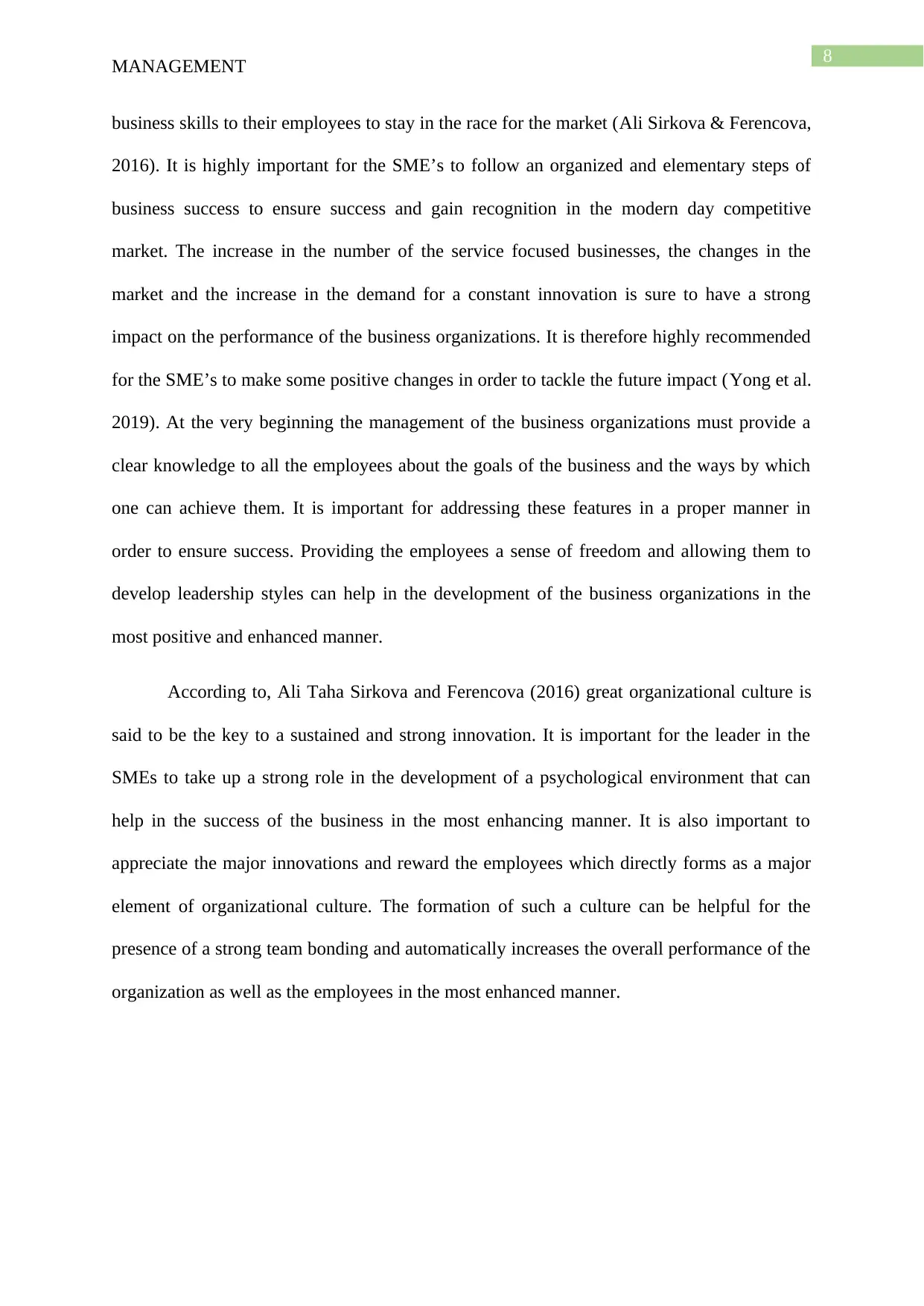
8
MANAGEMENT
business skills to their employees to stay in the race for the market (Ali Sirkova & Ferencova,
2016). It is highly important for the SME’s to follow an organized and elementary steps of
business success to ensure success and gain recognition in the modern day competitive
market. The increase in the number of the service focused businesses, the changes in the
market and the increase in the demand for a constant innovation is sure to have a strong
impact on the performance of the business organizations. It is therefore highly recommended
for the SME’s to make some positive changes in order to tackle the future impact (Yong et al.
2019). At the very beginning the management of the business organizations must provide a
clear knowledge to all the employees about the goals of the business and the ways by which
one can achieve them. It is important for addressing these features in a proper manner in
order to ensure success. Providing the employees a sense of freedom and allowing them to
develop leadership styles can help in the development of the business organizations in the
most positive and enhanced manner.
According to, Ali Taha Sirkova and Ferencova (2016) great organizational culture is
said to be the key to a sustained and strong innovation. It is important for the leader in the
SMEs to take up a strong role in the development of a psychological environment that can
help in the success of the business in the most enhancing manner. It is also important to
appreciate the major innovations and reward the employees which directly forms as a major
element of organizational culture. The formation of such a culture can be helpful for the
presence of a strong team bonding and automatically increases the overall performance of the
organization as well as the employees in the most enhanced manner.
MANAGEMENT
business skills to their employees to stay in the race for the market (Ali Sirkova & Ferencova,
2016). It is highly important for the SME’s to follow an organized and elementary steps of
business success to ensure success and gain recognition in the modern day competitive
market. The increase in the number of the service focused businesses, the changes in the
market and the increase in the demand for a constant innovation is sure to have a strong
impact on the performance of the business organizations. It is therefore highly recommended
for the SME’s to make some positive changes in order to tackle the future impact (Yong et al.
2019). At the very beginning the management of the business organizations must provide a
clear knowledge to all the employees about the goals of the business and the ways by which
one can achieve them. It is important for addressing these features in a proper manner in
order to ensure success. Providing the employees a sense of freedom and allowing them to
develop leadership styles can help in the development of the business organizations in the
most positive and enhanced manner.
According to, Ali Taha Sirkova and Ferencova (2016) great organizational culture is
said to be the key to a sustained and strong innovation. It is important for the leader in the
SMEs to take up a strong role in the development of a psychological environment that can
help in the success of the business in the most enhancing manner. It is also important to
appreciate the major innovations and reward the employees which directly forms as a major
element of organizational culture. The formation of such a culture can be helpful for the
presence of a strong team bonding and automatically increases the overall performance of the
organization as well as the employees in the most enhanced manner.
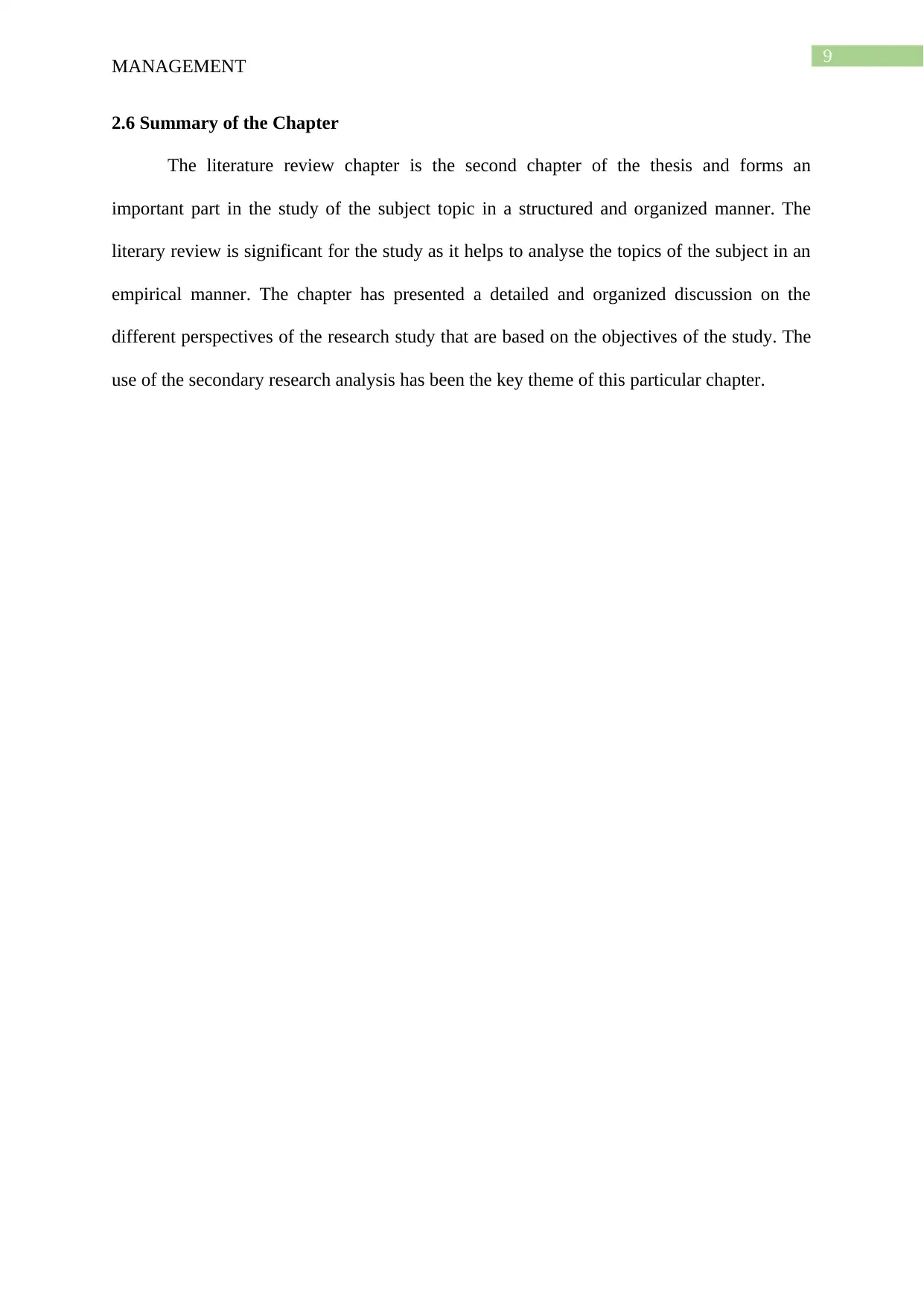
9
MANAGEMENT
2.6 Summary of the Chapter
The literature review chapter is the second chapter of the thesis and forms an
important part in the study of the subject topic in a structured and organized manner. The
literary review is significant for the study as it helps to analyse the topics of the subject in an
empirical manner. The chapter has presented a detailed and organized discussion on the
different perspectives of the research study that are based on the objectives of the study. The
use of the secondary research analysis has been the key theme of this particular chapter.
MANAGEMENT
2.6 Summary of the Chapter
The literature review chapter is the second chapter of the thesis and forms an
important part in the study of the subject topic in a structured and organized manner. The
literary review is significant for the study as it helps to analyse the topics of the subject in an
empirical manner. The chapter has presented a detailed and organized discussion on the
different perspectives of the research study that are based on the objectives of the study. The
use of the secondary research analysis has been the key theme of this particular chapter.
⊘ This is a preview!⊘
Do you want full access?
Subscribe today to unlock all pages.

Trusted by 1+ million students worldwide
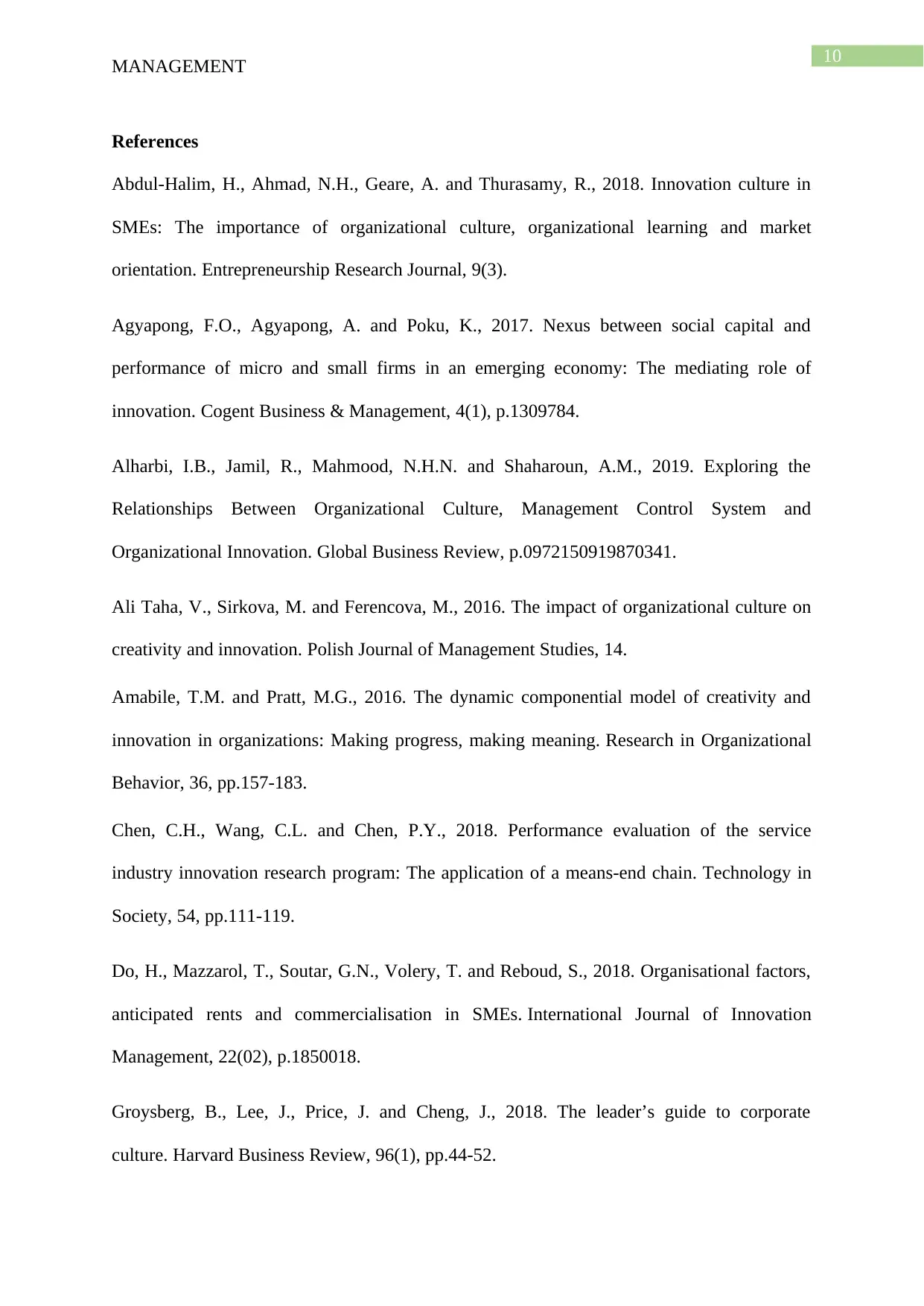
10
MANAGEMENT
References
Abdul-Halim, H., Ahmad, N.H., Geare, A. and Thurasamy, R., 2018. Innovation culture in
SMEs: The importance of organizational culture, organizational learning and market
orientation. Entrepreneurship Research Journal, 9(3).
Agyapong, F.O., Agyapong, A. and Poku, K., 2017. Nexus between social capital and
performance of micro and small firms in an emerging economy: The mediating role of
innovation. Cogent Business & Management, 4(1), p.1309784.
Alharbi, I.B., Jamil, R., Mahmood, N.H.N. and Shaharoun, A.M., 2019. Exploring the
Relationships Between Organizational Culture, Management Control System and
Organizational Innovation. Global Business Review, p.0972150919870341.
Ali Taha, V., Sirkova, M. and Ferencova, M., 2016. The impact of organizational culture on
creativity and innovation. Polish Journal of Management Studies, 14.
Amabile, T.M. and Pratt, M.G., 2016. The dynamic componential model of creativity and
innovation in organizations: Making progress, making meaning. Research in Organizational
Behavior, 36, pp.157-183.
Chen, C.H., Wang, C.L. and Chen, P.Y., 2018. Performance evaluation of the service
industry innovation research program: The application of a means-end chain. Technology in
Society, 54, pp.111-119.
Do, H., Mazzarol, T., Soutar, G.N., Volery, T. and Reboud, S., 2018. Organisational factors,
anticipated rents and commercialisation in SMEs. International Journal of Innovation
Management, 22(02), p.1850018.
Groysberg, B., Lee, J., Price, J. and Cheng, J., 2018. The leader’s guide to corporate
culture. Harvard Business Review, 96(1), pp.44-52.
MANAGEMENT
References
Abdul-Halim, H., Ahmad, N.H., Geare, A. and Thurasamy, R., 2018. Innovation culture in
SMEs: The importance of organizational culture, organizational learning and market
orientation. Entrepreneurship Research Journal, 9(3).
Agyapong, F.O., Agyapong, A. and Poku, K., 2017. Nexus between social capital and
performance of micro and small firms in an emerging economy: The mediating role of
innovation. Cogent Business & Management, 4(1), p.1309784.
Alharbi, I.B., Jamil, R., Mahmood, N.H.N. and Shaharoun, A.M., 2019. Exploring the
Relationships Between Organizational Culture, Management Control System and
Organizational Innovation. Global Business Review, p.0972150919870341.
Ali Taha, V., Sirkova, M. and Ferencova, M., 2016. The impact of organizational culture on
creativity and innovation. Polish Journal of Management Studies, 14.
Amabile, T.M. and Pratt, M.G., 2016. The dynamic componential model of creativity and
innovation in organizations: Making progress, making meaning. Research in Organizational
Behavior, 36, pp.157-183.
Chen, C.H., Wang, C.L. and Chen, P.Y., 2018. Performance evaluation of the service
industry innovation research program: The application of a means-end chain. Technology in
Society, 54, pp.111-119.
Do, H., Mazzarol, T., Soutar, G.N., Volery, T. and Reboud, S., 2018. Organisational factors,
anticipated rents and commercialisation in SMEs. International Journal of Innovation
Management, 22(02), p.1850018.
Groysberg, B., Lee, J., Price, J. and Cheng, J., 2018. The leader’s guide to corporate
culture. Harvard Business Review, 96(1), pp.44-52.
Paraphrase This Document
Need a fresh take? Get an instant paraphrase of this document with our AI Paraphraser
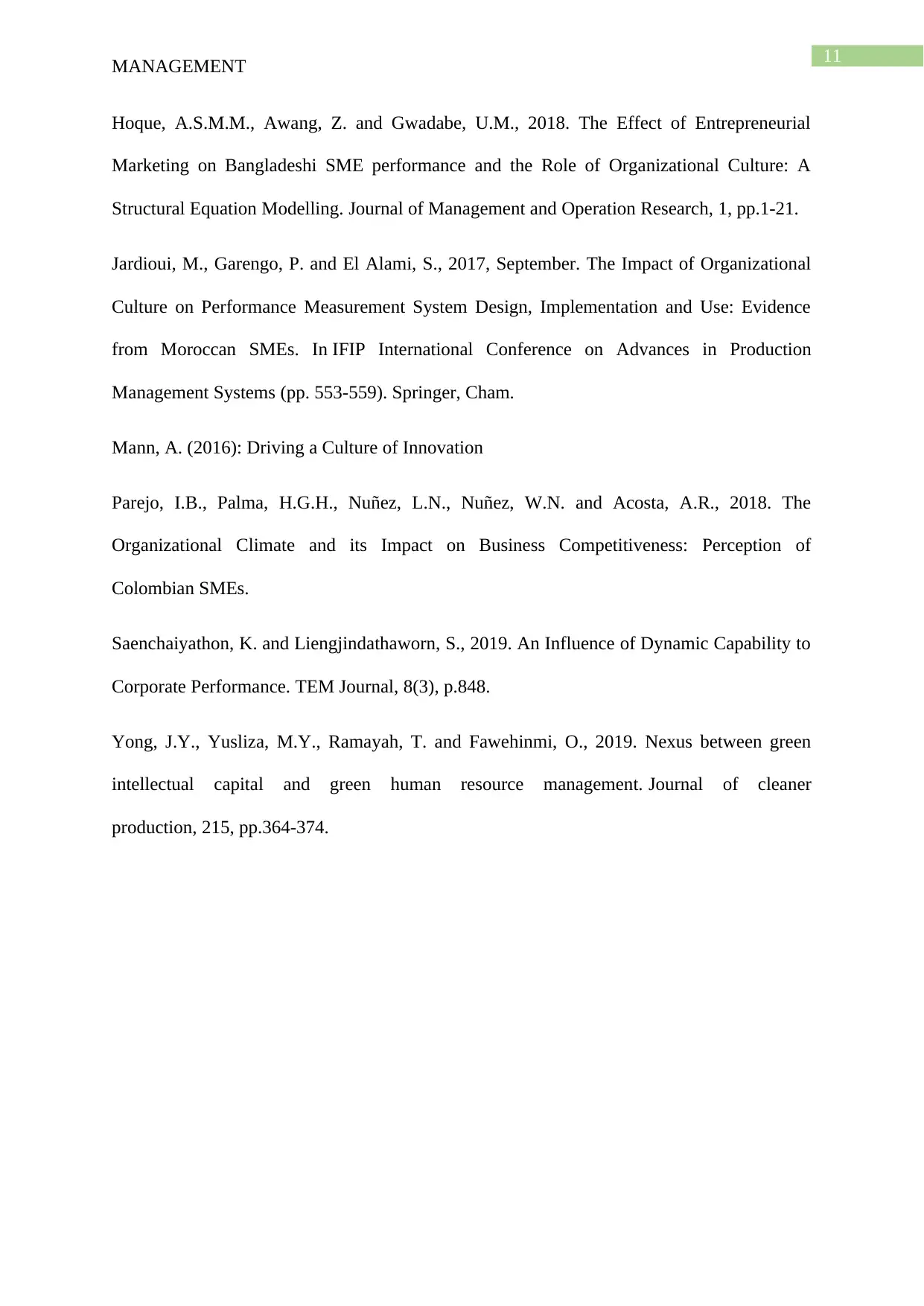
11
MANAGEMENT
Hoque, A.S.M.M., Awang, Z. and Gwadabe, U.M., 2018. The Effect of Entrepreneurial
Marketing on Bangladeshi SME performance and the Role of Organizational Culture: A
Structural Equation Modelling. Journal of Management and Operation Research, 1, pp.1-21.
Jardioui, M., Garengo, P. and El Alami, S., 2017, September. The Impact of Organizational
Culture on Performance Measurement System Design, Implementation and Use: Evidence
from Moroccan SMEs. In IFIP International Conference on Advances in Production
Management Systems (pp. 553-559). Springer, Cham.
Mann, A. (2016): Driving a Culture of Innovation
Parejo, I.B., Palma, H.G.H., Nuñez, L.N., Nuñez, W.N. and Acosta, A.R., 2018. The
Organizational Climate and its Impact on Business Competitiveness: Perception of
Colombian SMEs.
Saenchaiyathon, K. and Liengjindathaworn, S., 2019. An Influence of Dynamic Capability to
Corporate Performance. TEM Journal, 8(3), p.848.
Yong, J.Y., Yusliza, M.Y., Ramayah, T. and Fawehinmi, O., 2019. Nexus between green
intellectual capital and green human resource management. Journal of cleaner
production, 215, pp.364-374.
MANAGEMENT
Hoque, A.S.M.M., Awang, Z. and Gwadabe, U.M., 2018. The Effect of Entrepreneurial
Marketing on Bangladeshi SME performance and the Role of Organizational Culture: A
Structural Equation Modelling. Journal of Management and Operation Research, 1, pp.1-21.
Jardioui, M., Garengo, P. and El Alami, S., 2017, September. The Impact of Organizational
Culture on Performance Measurement System Design, Implementation and Use: Evidence
from Moroccan SMEs. In IFIP International Conference on Advances in Production
Management Systems (pp. 553-559). Springer, Cham.
Mann, A. (2016): Driving a Culture of Innovation
Parejo, I.B., Palma, H.G.H., Nuñez, L.N., Nuñez, W.N. and Acosta, A.R., 2018. The
Organizational Climate and its Impact on Business Competitiveness: Perception of
Colombian SMEs.
Saenchaiyathon, K. and Liengjindathaworn, S., 2019. An Influence of Dynamic Capability to
Corporate Performance. TEM Journal, 8(3), p.848.
Yong, J.Y., Yusliza, M.Y., Ramayah, T. and Fawehinmi, O., 2019. Nexus between green
intellectual capital and green human resource management. Journal of cleaner
production, 215, pp.364-374.
1 out of 11
Related Documents
Your All-in-One AI-Powered Toolkit for Academic Success.
+13062052269
info@desklib.com
Available 24*7 on WhatsApp / Email
![[object Object]](/_next/static/media/star-bottom.7253800d.svg)
Unlock your academic potential
Copyright © 2020–2025 A2Z Services. All Rights Reserved. Developed and managed by ZUCOL.





